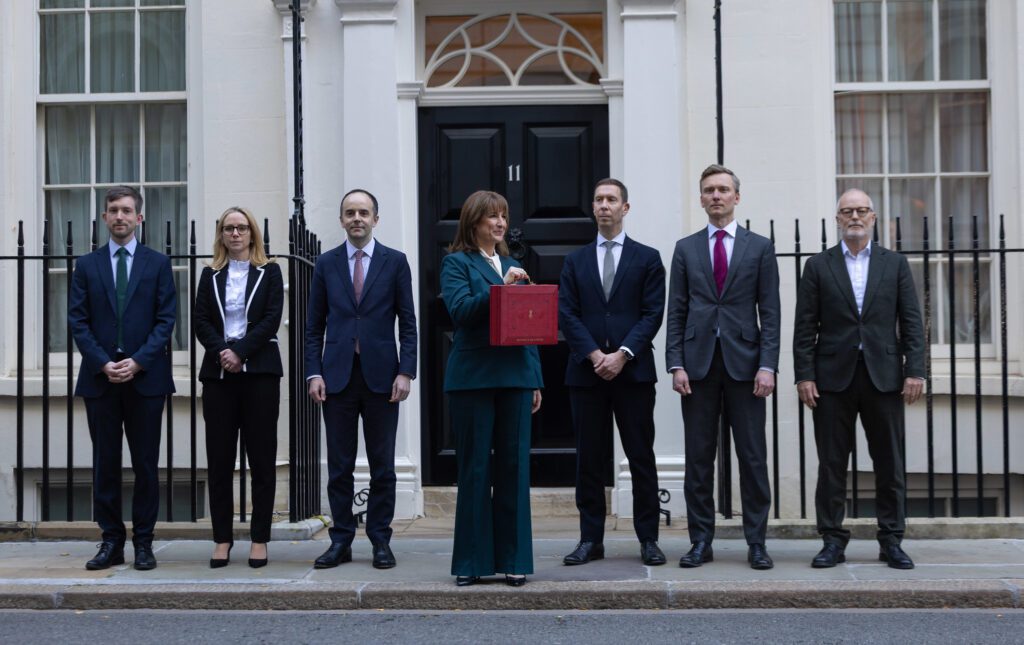Reeves’ budget arrived, as ever, with all the solemnity of an establishment prostrated in deference to spreadsheets and a lust for the gilt market alongside an ardent pursuit of welfare-to-work schemes. Budgets, after all, are merely annual rituals in which the state reassures us that inequality is regrettable yet simultaneously inevitable, and that justice must wait its turn behind market confidence. When voters begrudgingly make their way to the ballot box, there is consistently a general apprehensiveness to elect a perceived horde of distinctly unsympathetic white collar men, ironically parachuted into post-industrial mill towns from their parliamentary research role. Thus, when voters lament that “they’re all as bad as each other”, it expresses how it is embedded into our political consciousness that the system itself is in conflict with the will of the people. If the country appears structurally unfair, the fault, we are reminded, lies not in our economic system but in our personal budgeting skills. It is precisely this sleight of hand that makes socialism not an anachronistic creed but the only language left for describing a society still baffled by the poverty it continues to manufacture.
The 2025 Budget
When Reeves announced a freeze on income‑tax thresholds through to 2030‑31, the jovial cheers for those who feel wronged on a viciously unfair progressive tax system in comparison to their jet-setting superiors were unfortunately premature; a country and workforce constantly adjusting to real income growth ensures workers will gradually be brought into the fold of an expanding tax base in the form of a fiscal drag. Beyond tax and welfare, the Budget included a host of smaller but cumulative changes. Reductions to the tax‑free portions of some savings vehicles (e.g. ISAs), reform of pension contribution rules, and tighter rules for capital tax reliefs – the net effect for many households is a squeeze on disposable income and thus one may be forgiven for thinking workers are not getting a fair deal from this budget. The glaring reality is that even policies in hot pursuit of social democratic, macro-reforms nibble at the edges of injustice. Every tweak, freeze, rise, loss, gain, packaged as either an unfortunate sacrifice or grand victory either spares a worker a menial amount, or even leaves them worse off. If there is an abundance of surplus, food wastage, profit hikes to make Rockefeller himself blush, why are workers still bearing the brunt?

Recent data make both painfully and embarrassingly clear just how acute the crisis of poverty has become in Britain. In 2023/24, around 4.5 million children (roughly 31 per cent of all children in the UK) lived in relative poverty after housing costs. The alarming statistic that a majority of these children – 72 per cent – reside in households where at least one adult works, then, is seemingly immune to the sneering attitude from the likes of Thatcher and Howe that workshy, feckless societal drains are culpable for dwindling living conditions and household food scarcity. Those in larger families are worst hit: 44 per cent of children in households with three or more children are in poverty, compared with 25 per cent of those in two-child families and only 21 per cent in single-child households. Thus, Reeves’ refreshing announcement that the two-child benefit cap will be lifted is met with a sigh of vindicating relief from those punished for the crime of giving birth. But yet, the buckling weight of systemic poverty remains; the lesson is ultimately whether Labour are ready to confront the forces of exploitation which govern this suffering. Thus, the rallying cry of “things can only get better” falls short for countless families and workplaces up and down a nation rife with economic misery.
Poverty
Victorians often saw poverty as a transient state. A poor person was someone in the passenger seat to riches, akin to an ape on his evolutionary journey to homosapiens, and thus the state intervening in the laws of the marketplace would only derail this desirable evolution. We have largely evolved past this stage – much like apes – though not quite the cleansed utopia dreamt up by various socialist thinkers where poverty is widely accepted as a manufactured societal ailment, made arable by the dynamics of exploitation. We now have developed theories on wealth inequality and economic injustice wrapped up in enough academic sophistry to make Marx himself blush; welfare states robust enough that they’re relentlessly shrouded in allegations of being vessels of the Nanny State, yet simultaneously those dependent on them never quite escaping the lives of deviancy and struggle that material abundance absolves us of. Dominic Raab, summing up this worldview with characteristic precision, once declared that the typical food bank user “was not someone languishing in poverty, but someone who had a cash flow problem episodically.” In other words, poverty is never a structural misfortune, but rather a brief inconvenience in the grand evolutionary journey toward affluence.
After a while, poverty became an irritating spot that we grew to accept was probably a mole, and thus here to stay as a hideous stain on an otherwise unblemished utopia. Ideologically, though, it became growingly unacceptable. Religious movements, philanthropy, and later secular humanitarian impulses emphasised the intrinsic dignity of all humans. The focus was moral and emotional – poverty was no longer just unfortunate, it was unjust in a human sense. Suffering was something that ought to be alleviated, regardless of economic “inevitability.” Beyond a moral injustice, though, it was a recurring nightmare for the political class; too stark a division between the rich and the poor was politically destabilising. Benjamin Disraeli, issuing a political project that embodied a man waking up in cold sweats at the idea of poverty-stricken armed insurrectionists, gave birth to modern-day reformist measures. Decades later, figures just as Dickensian such as Boris Johnson would drag Disraeli’s seminal project – principally espoused in his book “Sybil: or the Two Nations” – into disrepute when he coupled his car-crash of a premiership with the declaration that “I am a one-nation Conservative.”
The 1970s arrived, in all its muddled promise of progress, flared trousers, and disco-fuelled nihilism, and yet poverty was now starting to resemble a bad joke. Reports and surveys revealed it lurking not just in the slums but in the very heart of suburban streets, and suddenly the shrug of “everyone pulls themselves up eventually” felt embarrassingly quaint. Stagflation, unemployment, and the oil crisis made economic hardship hard to ignore, while sociologists and economists busied themselves giving poverty a respectable, technical name— “relative deprivation”—so that nobody could mistake it for mere personal failure. Welfare programs had expanded, yet the image of the welfare-dependent lingered like a persistent stain.
Thatcher
Thatcher’s glinting ascent marked a new checkpoint in British culture; in May 1979, she unashamedly advertised the neon-lit narcissism of excess and the return of ‘the Feel-Good Factor’. When monetarism and containerisation bulldozed local economies, notably Liverpool and Newcastle amongst the most afflicted, her acolyte Norman Tebbit argued the onus was on the unemployed to “get on their bike and find work,” just as his father so valiantly did in the aftermath of the Great Depression. In some sense, post-war Britain muddled along with a civic sense that poverty was, at least, a shared disgrace. Thatcher, in all her sanguine virility, arrived on the steps of 10 Downing Street to deliver the tragic news that we were on our own, merely solitary atoms of self-assured consciousness; that poverty and suffering was the cosmic punishment for those unfortunate enough to stumble beneath its inexorable law.
It shouldn’t come as too much of a surprise that when Tony Blair – who Margaret Thatcher once boasted was her proud lovechild – arrived in 1997, his red rosette was not enough to fool everyone. His meteoric ascension affirmed the suspicion that preaching from a red despatch box didn’t automatically mark a progressive future and signalled the end of the hopeful contradiction that youthful radicalism and centrist managerialism could live together in harmony. Unsurprisingly to many, being pictured with Oasis and drinking pints with rolled up shirtsleeves did not afford him the luxury of being able to completely shake the Oxford graduate, Middle England pneuma in which he was immaculately clad in.
An authority as unimpeachable as the Son of God said that the poor were always with us. Ironically, it is modern day Capitalism that has assumed a quasi-religious form whereby its followers have been divorced from their conditional support, now venerating the market with the devotion of a Nicene Creed. And in recent years, the piety has metastasised into fanatical abandon. Striking workers cast as heretics and the rituals of profit and quarterly earnings as the Apollonian exemplar of reason and order.
The British class system
To understand why Britain continues to wobble under the weight of its own class system, it helps to peek behind the velvet ropes of power – not that anyone on the outside ever really gets a look. Privilege in Britain is less an accident of birth than a choreographed apprenticeship in influence. While the rest of the country navigates the churning uncertainty of precarious work and ever-rising living costs, a few institutions quietly perfect the art of fine-tuning adolescents into diplomats and party leaders.
I know nothing of what actually goes on behind the doors of Eton and Harrow – or any private school for that matter, as my Catholic state education only afforded me the luxury of scribbled-on textbooks and a lifetime of guilt rather than extensive networks into British politics. However, it‘s no secret that these elite institutions breed a certain type of meticulously scripted state official. If they are asked whether it’s true that they have cunningly embezzled their expenses on lampshades or slotted spoons from Marks & Spencer, they are quick to retort that there are matters of far greater importance to attend to like the cost of living, or coldly condemning Hamas.
Eton and Harrow reign supreme in their manufacturing of these types – out of the 57 individuals who’ve ever taken Prime Ministerial office in Britain, twenty of them attended Eton College and seven attended Harrow. Boris Johnson was the immaculate emblem of the industrially manufactured politician from which his Etonian milieu is almost synonymous with. Brushing shoulders with Cameron – whom he later went on to feud with – he was, what we often call the poor when they stab someone on their pebble-dashed council estate, a product of his environment. Figures like Johnson aren’t easily marooned from the occupation in which his parliamentary counterparts on the Labour benches with their union backgrounds can be sublimely detached from. Boris Johnson is just a politician, stamped and packaged, destined to legislate.

Capitalism and socialism
Capitalism, as we know it, renders the human being utterly expendable. Zero hour contracts, “trial shifts”, the ever looming threat of destitution should your team not meet sales targets. Deep inside all of us, there is a yearning that we don’t want to be arbitrarily let go – we are utterly terrified of being abandoned. Socialism, then, greatly exceeds economic theory or a ledger of redistribution. Emotionally, it expresses a deep-seated longing that we always have a place in the world’s heart; not just to be cast to the side of a curb in a sleeping bag, left to ferment alone in one’s filth – that we will not be cast out.
Should workers ever stumble across Capital Volume I by Marx en masse, it would hardly strike them as a revelation. Sure, the terminology would be alien to them, but the theories themselves would feel distinctly unremarkable. A worker feels exploitation in his bones when his back aches as his boss texts him from the Bahamas asking him why he was twenty minutes late that morning. He feels it when he and his wife hold back the tears when they tell their children Father Christmas isn’t coming this year. He feels it with every panicked shiver when the energy bill letters falls pitifully on the doormat. Every factory floor, every pub, every shop till is filled with individuals who have a socialist knocking on the door to come out.
The debate on socialism has often been opposed by its archetypal nemesis – capitalism. The two are argued to be cosmic opposites, Yin & Yang, forever pointing the finger at each other’s ills or gurning about the days of Soviet-era bread queues. However, socialists don’t exist in the same realm as those that describe themselves as capitalists – hence a “capitalist” university society is an almost unheard rarity (a Conservative society at most, although true Conservatives shouldn’t concern themselves with finance capital, but that’s a debate for another day), yet virtually every campus globally will have a group of at least ten students waving the red flag and fiercely talking about rent controls through a megaphone. This is because socialism is, firstly, an entirely provisional matter. To tear down the Che Guevara poster from your wall, bin that beaten up copy of Capital, stay home and finish that painting rather than attend another tedious committee meeting, is a yearning at the heart of every true socialist. That there is life after socialism, is the point of socialism.
In that regard, a capitalist is more akin to a Buddhist; a socialist, by comparison, is a self-thwarting figure, working towards a world that no longer requires them, more akin to a doctor or a pharmacist. An ideology centred around consolidation and exponential growth such as capitalism, on the other hand, is wholly and utterly self-preserving. The idea of its end is the existential dread which has motivated most policy action in the 20th and 21st centuries. Capital has become so tightly woven into the fabric of the British state that any fleeting attempt to redress material privilege has been treated as an act of sedition. When the miners dared to resist the gospel of the market, the state responded with riot shields and truncheons. The police, sworn to be the custodians of public order, became the militarised wing of a neoliberal revolution. When the miners eventually succumbed to starvation and military onslaught, Tebbit proudly claimed: “we broke not just the strike, but the spell.” The “spell” he was referring to was the unseen outstretched hand that reminded us of our kinship and unity; the invisible threads of community that prevented us from being subjugated by tyranny.
Final thoughts
Thus, what kind of liberating macro-reforms can an autumn budget truly bring us? If Britain still needs socialism, it is not because socialism offers some utopian cartography for a land beyond scarcity, but because the alternatives have become so comically threadbare that they no longer even pretend to describe the world we inhabit. The British state has always been adept at converting systemic horror into personal failure, as though capitalism were a sort of celestial weather system whose tempests we must simply dress appropriately for. Socialism, then, is unfashionable enough to maintain that poverty is not an act of God and that the nation’s entrenched hierarchies are not encoded in the genome. Scandalously, it suggests that human beings deserve institutions built around their flourishing rather than their subordination. Put simply, deep inside workers, even when the Union flags are out in force, even in every chant of “save our kids” rather than “The Red Flag”, we don’t just want the crumbs from the edge of the table anymore, we want the whole cake.
Featured image via Rwendaland / Wikimedia Commons.


